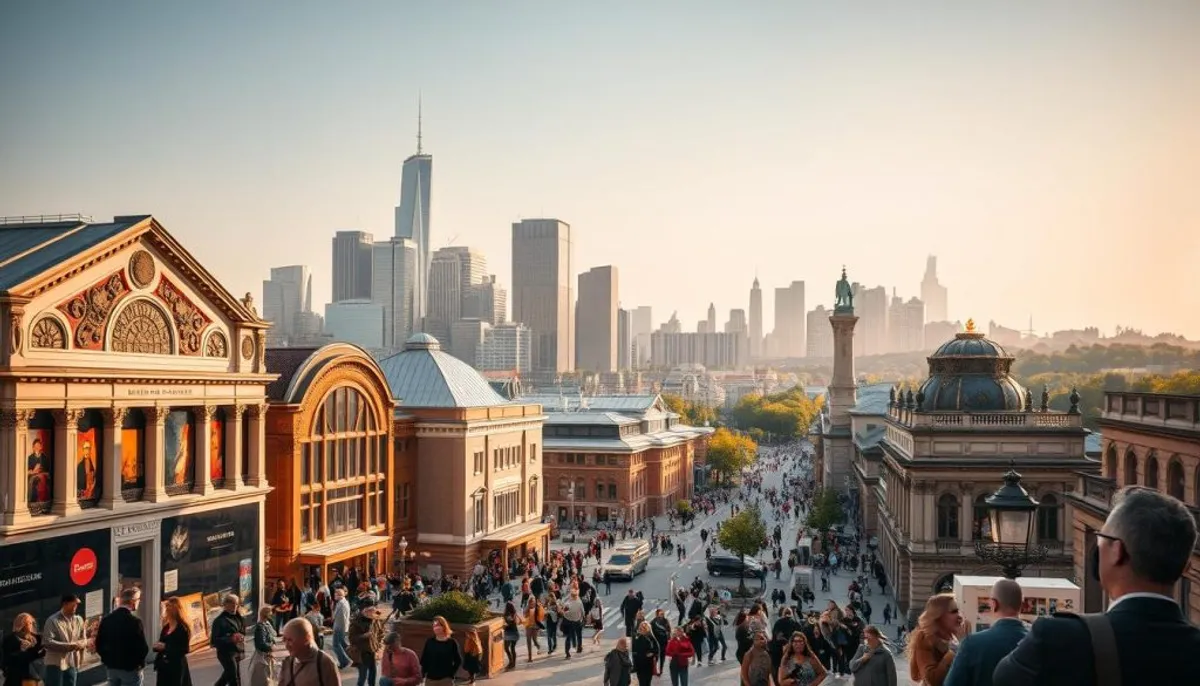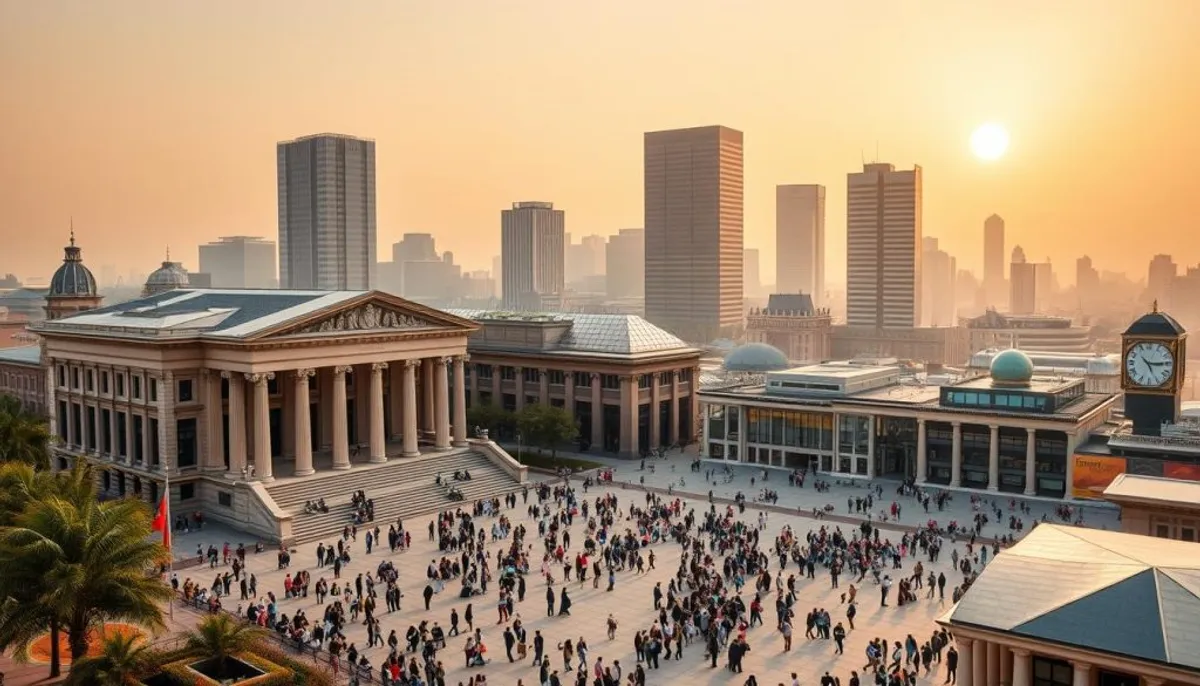Culture shapes our daily lives and defines our collective identity. It encompasses art, music, literature, and much more. What is the importance of culture in society? It plays a crucial role in our personal and social development.

The numbers speak for themselves: culture influences 95% of our behaviors and values. It also contributes to the economy. In Ontario, it represented 3.7% of GDP in 2010, amounting to 22 billion dollars. The cultural sector employed 280,000 people, 4.1% of jobs in the province.
Social cohesion is strengthened through culture. 80% of people believe it is essential to their identity. Schools that integrate the arts achieve better results in reading and mathematics. Culture also promotes the health of seniors, reducing their isolation.
In our connected world, culture adapts. Ontario had more than 120 online learning companies. International travel increased by 25%, allowing for the discovery of other cultures. 65% of people believe in intercultural dialogue for world peace.
What is the importance of culture in society
Culture is essential in our modern society. It shapes our cultural identity, strengthens social cohesion, and contributes to personal development. Let us explore together the different facets of its importance.
The fundamental role of culture in social cohesion
Culture acts as a social glue, fostering mutual understanding and respect among groups. In businesses, a positive culture improves job satisfaction and reduces turnover. Soluflex's interventions with Quebec SMEs illustrate how promoting a culture of inclusion stimulates growth and sustainable development.
Culture as a vector of collective identity
Culture forges our collective identity, creating a sense of belonging. It is reflected in our educational systems, business practices, and economic choices. For example, Christmas markets in Europe generate significant economic activity, demonstrating the impact of cultural traditions on the local economy.
The impact of culture on personal development
Exposure to various cultural expressions enriches our perspectives and stimulates our creativity. The Démos project at the Philharmonie de Paris demonstrates that musical education enhances cognitive and social skills. Similarly, cultural diversity within teams fosters innovation and leads to more creative solutions.
| Aspect | Impact of culture |
|---|---|
| Social cohesion | Improvement in job satisfaction, reduction in turnover |
| Collective identity | Influence on economic choices and business practices |
| Personal development | Enhancement of cognitive and social skills, stimulation of creativity |
Cultural diversity: a treasure of our heritage
Cultural diversity is a true treasure of our collective heritage. It illustrates the variety of artistic expressions, traditions, and lifestyles, enriching our society. UNESCO highlighted its importance by adopting the Universal Declaration on cultural diversity in 2001. This declaration considers it a common heritage of humanity.
Artistic expressions and traditions
Cultural manifestations occur in various forms, from visual arts to music, dance, and literature. These artistic expressions illustrate the richness of our cultural heritage. Eurovision, created in 1956, remains a major event celebrating European musical diversity.
Intercultural dialogue
Intercultural exchanges promote mutual understanding and social peace. The European Union, with its motto “United in diversity,” actively encourages this dialogue. The “Creative Europe” program funds numerous cultural projects, such as supporting 16 feature films at the Cannes Film Festival 2024.

The preservation of cultural identities
The protection of cultural identities is essential, especially for the languages, arts, and lifestyles of minority peoples. The European Union has initiated several actions, such as the European label for the protection of cultural sites in 2007 and the European Year of cultural heritage in 2018.
| Initiative | Year of creation | Impact |
|---|---|---|
| European Capital of Culture | 1985 | Bourges will be honored in 2028 |
| European Night of Museums | 2005 | More than 3000 participating museums in 2024 |
| Directive on copyright | 2019 | Better protection for creators |
Cultural policies and their role in modern society
Cultural policies are essential in our current society. They directly influence access to culture and encourage creative industries. In France, these policies aim to enrich the cultural life of all citizens.
Access to culture for all
Access to culture is considered a fundamental right in France. The 1946 Constitution stipulates equal access to culture for all. The Ministry of Culture, created in 1959, aims to democratize culture. It transforms elitist culture into a culture accessible to all.
Local and national initiatives encourage cultural participation. They particularly target disadvantaged areas. The state collaborates with local authorities, businesses, and associations to achieve this goal.
Support for cultural industries
Cultural industries play a crucial role in the French economy. In 2018, their revenue reached 91.4 billion euros. Traditional sectors such as visual arts and live performance remain essential.
| Sector | Revenue (billion €) |
|---|---|
| Visual arts | 23.4 |
| Advertising | 17.0 |
| Television | 12.0 |
| Press | 10.5 |
| Live performance | 9.1 |
Local and national initiatives
Cultural policies adapt to societal changes. They aim to prepare citizens for the future. Artistic education in schools is evolving. It no longer only meets the needs of the industry but also develops well-rounded individuals.

Modern cultural policies seek to balance cultural production and consumption. They support diversity and inclusion. These initiatives contribute to building a more equitable and culturally rich society.
Cultural transmission in the digital age
The digital age is revolutionizing cultural transmission. Arts and traditions are adapting to new technologies, offering new perspectives for their dissemination and preservation. Online platforms are becoming essential vehicles for cultural sharing, allowing unprecedented accessibility to works and knowledge.
Digital cultural mediation transforms the visitor experience in museums and heritage sites. Innovative tools like the Histopad, used at the Palais des Papes in Avignon and the Château de Chambord, enhance the discovery of heritage. QR codes and NFC technology facilitate access to information, while augmented reality and interactive holograms offer a fascinating immersion into history and art.
However, this digital revolution raises environmental questions. The production of digital tools generates 88% of greenhouse gas emissions related to this sector. Data centers, necessary for storing and disseminating cultural content, have a significant carbon footprint. It is crucial to find a balance between innovation and sustainability in digital cultural transmission.
Despite these challenges, the digital age opens new avenues for the democratization of culture. Libraries, cultural centers, and museums are leveraging these technologies to reach a broader and more diverse audience. Cultural transmission is thus enriched with new forms of expression and interaction, reinventing our relationship with heritage and artistic creation.
Conclusion
The importance of culture in society is undeniable. Before the pandemic, France recorded over 63 million entries into its museums and heritage sites. This trend, even diminished by the health crisis, demonstrates the persistent interest in our cultural heritage.
Cultural diversity enriches our daily lives and shapes our collective identity. It is now valued in the professional and academic world. Business schools and universities are increasingly integrating general culture into their selection criteria. They recognize its crucial role in personal and professional development.
Cultural identity is built through knowledge and openness. Educated students demonstrate a better ability to argue and adapt. These assets are valuable for their future careers. Culture is not a luxury but an investment for the future. It contributes to a richer, more open, and more inclusive society.
RelatedRelated articles


